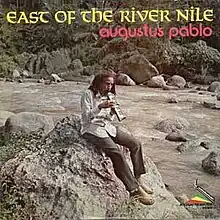| East of the River Nile | ||||
|---|---|---|---|---|
 | ||||
| Studio album by | ||||
| Released | 1977 | |||
| Recorded | 1977 | |||
| Studio | Harry J's, Channel One, King Tubby's and Black Ark | |||
| Genre | Dub | |||
| Length | 41:09 | |||
| Label | Message Records, Shanachie | |||
| Producer | Horace Swaby | |||
| Augustus Pablo chronology | ||||
| ||||
| Review scores | |
|---|---|
| Source | Rating |
| AllMusic | |
| Robert Christgau | A[2] |
East of the River Nile is a 1977 reggae studio album (see 1977 in music) by Jamaican musician Augustus Pablo. A purely instrumental album, East of the River Nile showcases Pablo's skill on the melodica, and various other keyboards. Also featured are studio musicians famous as members of The Wailers, Bob Marley's backing band.
A reissue of East of the River Nile, with six bonus tracks, charted on Billboard's Reggae Albums chart in 2002 (see 2002 in music), peaking at #13.
Track listing
All track composed by Horace Swaby
All tracks mixed by King Tubby, except "Upful Living" mixed by Lee Perry
- Side one
- "Chant to King Selassie I" (with Ja-Malla Band)
- "Natural Way" (with Ja-Malla Band)
- "Nature Dub"
- "Upfull Living" (with The Upsetters)
- "Unfinished Melody" (with The Upsetters)
- "Jah Light"
- Side two
- "Memories of the Ghetto" (with The Upsetters)
- "Africa (1983)"
- "East of the River Nile"
- "Sounds from Levi"
- "Chapter 2"
- "Addis Ababa"
- 2002 CD reissue extra tracks
- "East Africa"
- "East of the River Nile" (Original)
- "Memories of the Ghetto Dub"
- "Jah Light Version"
- "Islington Rock"
- "Meditation Dub"
Personnel
- Augustus Pablo – organ, piano, strings, keyboards, clavinet, melodica
- Aston "Family Man" Barrett – bass
- Clayton Downie – bass
- Robert "Robbie" Shakespeare – bass
- Earl "Bagga" Walker – bass
- Carlton "Carlie" Barrett – drums
- Noel "Alphonso" Benbow – drums
- Max Edwards – drums
- Earl "Chinna" Smith – lead guitar
- Everton Da Silva – percussions
- Ja-Malla Band – played on "Chant to King Selassie I" and "Natural Way"
- The Upsetters played on "Upfull Living", "Unfinished Melody" and "Memories of the Ghetto"
- Technical
- Ernest Hookim, Errol Thompson, Lee Perry, Prince Jammy, Sylvan Morris – engineer
- King Tubby – mixing
- Lee Perry – mixing
- Orville "Bagga" Case – artwork
- Walsh's Photo Studio - cover photography
References
- ↑ Allmusic review
- ↑ Christgau, Robert (30 December 2003). "Consumer Guide: Who Needs Boxes?". The Village Voice. New York. Retrieved 23 December 2013.
External links
This article is issued from Wikipedia. The text is licensed under Creative Commons - Attribution - Sharealike. Additional terms may apply for the media files.